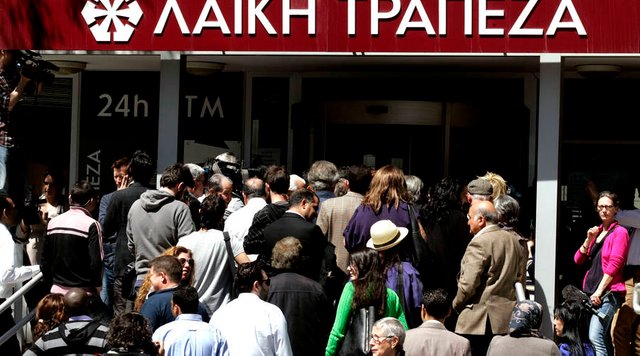Greece as an Example for the Power of BitCoin
Overthrowing the Monopolistic Financial Tyranny
Explaining BitCoin with Greece as an example
A few years ago in today's Greece the financial system has revealed its dark side. People could only withdraw small amounts of money from their accounts, government employees wouldn't get paid in time, if at all, pensions and benefits were being curtailed, and the economic downturn gained momentum. The corporate media even had the insolence of calling those austerity measures innocuous-sounding names like "reforms" or even "haircuts", as if it was something that doesn't hurt at all. The answer to this by the "Troika" (meaning IMF, ECB and the EU-Commission) was to force the Greek government to raise the taxes.
The Guardian, on September 15 2015 writes in an Article called »Greek Election 2015: everything you need to know«:
Greece has received more than €300bn of international bailouts. But these came with strict terms attached: a series of brutal austerity programs entailing deep budget cuts and steep tax increases.
Short version of the story
The Greeks elected the Syriza Party, led by Alexis Zipras, who's stated objective was to finally stop this downward spiral. They promised to refuse the bailout. Not because they wouldn't want the money, but because they didn't want the austerity measures attached to it. The Greek people never saw a single cent of this money. It went straight back to the banks other EU nations borrowed it from to "give it to Greece". However, that wasn't humanitarian aid, like it sometimes sounds when one listens to the regime's propaganda. It was a predatory attack by the Banking Cartel not only on Greece, but on the peoples of Europe. Greece just served as a proxy.
The Mechanism
Let's have a closer look on how this mechanism works by reducing this scenario to two people and a bank. One is a homeless, the other one has a good job and a big house that's long paid off. Sometimes they meet at the bar and they go: "What a nice life you have, laying in the sun all day long, no appointments, nobody pestering you, no stress at work", while the other says: "I wish I could have such a nice house, but I can't even find a job..." They could even be friends. But then, there is a bank...
Could the homeless guy go to the bank and ask for a loan? He probably wouldn't even get past the security guard. Could the guy with the nice house go to the bank and ask for a loan? He sure could, and the bank would love to lend him some freshly printed money, but this guy doesn't need a loan.
That's too bad, because that's how banks make their money: By giving out loans. Well, obviously not to homeless guys, because they will default and the bank doesn't gain anything.
The idea is to give the homeless guy a loan by using the rich guy as a warrantor. If the homeless guy defaults, which he will, the bank takes the house of the rich guy. That's what they call "collaterals".
Now, in this case it wouldn't work, because the rich guy wouldn't be stupid enough to accept such a deal. But that's what governments are there for. They can just decide for the rich guy as a taxpayer that he has to accept the loan, and the governments get their fair share for doing so.
Of course the rich guy will now send some thugs over to make sure that that lazy bum makes an effort to pay back the money. His house is in the line now, after all. And the poor guy will refuse, since he didn't ask for a damn loan and never saw the money in the first place.
Now those two guys can't be friends anymore, which has a positive side effect for the bank, because now both will be so busy fighting each other that they won't have time to realize that they've both been fooled. And in the end the bank will get a big house in return for printing some worthless Euro bills - who cares about those bills? We do. That's our problem...
Back to Greece
What happened here was massive a transfer of wealth from the rest of Europe to the Banking Cartel. That's the intention behind what is called "bailout". In Germany they even use the cynical term "rescue parachute"; of course without mentioning that it's the banks that are being rescued - not the Greeks. The Greeks are trapped and couldn't get out of it if they wanted to.
What happened after the Greek election? There was a referendum, as some might recall. The Greek people voted with "NO" (Greek: "OXI") against the bailout. If there was any further proof needed that the peoples will doesn't count, here we have it. What happened after the referendum? Nothing. Business as usual, except that some of the politicians stepped down. This is nothing new. It has been good business practice for decades in so called "Third World" countries:
They are forced to take up loans with the World Bank or the IMF and then invest this money in projects run by US or EU corporations. The money in fact never leaves the place where it came from. And it is clear from day one that the loan can never be repaid. That way they can repossess their own projects.
The country they give the money to gets nothing from such a deal but debt, which is repaid with the country's resources. And in the end, the taxpayers from both countries will pay the bill anyway.
For more information on how that works in practice and what happens with politicians that refuse to sell out their peoples wealth, I can recommend reading »Confessions of an Economic Hitman« and also »New Confessions of an Economic Hitman« both written by John Perkins.
What is coming towards Europe?
I just took Greece as an example, because it is the first country in Europe to get smashed by the Cartel after 1945, but it won't be the last one. It is a process, which won't stop until the next reset in the system. Mind you: The last one was in 1949 - almost 70 years ago. Europe is ripe for harvest. Italy or Spain might be next. Or Italy *and* Spain. Or the whole of Europe. As George Friedman, CEO of StratFor, put it in his speech at the Chicago Council on Global Affairs: »If Europe becomes unstable, one of the central points of the international system becomes unstable. And Europe is clearly becoming unstable.«
It is just a matter of time until that house of cards, built on debt and fiat money, collapses. Collapse it must. Greece was just the beginning. The end might look like Germany looked in the beginning of the 1920s - if not like by the end of the 1940s.
One way to stop it, is not to use the money issued by the Banking Cartel and imposed on the people by their own government. Governments are also just proxies of the Cartel, by the way. The Cartel owns the land, the government is the henchman who swings the whip, and we are the ones picking cotton. Every now and then we can decide to change the henchman, and we always choose the one that promises the best gloves. What is happening in Greece will happen in the rest of Europe also. It's just a matter of time.
We, who live today, have the opportunity to counteract those predatory practices, though. Our ancestors didn't have that option. We have money that we can use, and which is not controlled by the Cartel. It has the same properties that made gold the most important medium of exchange for centuries: It is scarce, divisible, unforgeable and indestructible. Plus: It is secret and can't be stolen or confiscated by the government.
Nobody would work for a piece of paper that doesn't even have one of those attributes, if it wasn't for the henchman called government forcing people to use it by imposing laws defining what "legal tender" is. Precious metals and BitCoin, on the other hand, do not need to be forced on people. They are accepted for the value they represent.
Mario Draghi could devalue all our savings by pushing a button to increase the money supply. Oh, wait. That's already happening. Some government could come up with the idea of implementing an unconditional basic income, or they could just crash the whole thing, which would render all savings worthless over night. It happened in the past. It will happen again. It's a mathematical certainty. And why would people in their right mind wait until that happens, if there is a simple way of avoiding all of it? Answer: Because that's what most people always do.
Friedman ends his speech with this sentence:
»What happens in this Europe? One is immediately tempted to say "nothing", because most people always think that nothing will happen. Listen to the artillery fire in the East. Those are the drum beats of the future...«
The gang consisting of politicians and banksters won't just step back and give up their monopoly. But the genie is out of the bottle by now. There is no turning back. BitCoin is the perfect money for the times we live in. It can be sent around the globe at very little costs. The transaction can be tracked, the person cannot, neither can it be attributed to a specific place.
The BitCoin system has an in-built immunity against state officials. It is easy for them to trace the money flow of their own banks. But if they try to trace BitCoin transactions, they will come to nothing. A BitCoin user trying to protect his money from seizure by the authorities "is about as likely to be caught as a fox being traced by a pack of one-legged hunting tortoises"[1].
There are no central servers that could be shut down, there is no "BitCoin Inc." that could be closed down or forced into bankruptcy, there is no owner that can be imprisoned or poisoned. It is free software that anyone can use without asking anyone for permission.
Once the ponzi scheme of the Banking Cartel gets exposed, there will already be a well working global monetary system in place as an alternative. The question now is: Do we really want to wait for the Cartel to call the shots? Again?
Why did I start with Greece?
Because Greece didn't only show how the Cartel works and what happens to countries that have been targeted by the Cartel, but it also showed how people can defend themselves against the Cartel.
Capital controls? That's a thing of the past. Why should I try to smuggle thousands of Euros across borders if I can just store them in the blockchain and access them from any part of the world? Even if I want to move trillions, all I need is a code. And that code I can type into my phone, write it down on a piece of paper, or simply memorize it.
In March of 2013 Cyprus got hit by a so called "banking crisis". All the accounts of the people were blocked and amounts above €100.000 got seized. People immediately started discovering the advantages of BitCoin. Too late for many that didn't discover it before their money got seized. They also lost the bonus: By now their money would have been worth about ten times as much as it was back then. Of course the rate could have gone down. But it automatically goes up in cases like that, when all of the sudden many people need BitCoin. It's a rule of a free market: If the demand goes up, so will the price.
People gather in front of Laiki (Popula) Bank as the country's banks re-open following 12 days of closure on March 28, 2013 in Nicosia, Cyprus. Amid the banking crisis in Cyprus, an online-only currency called Bitcoin is getting new attention.
Milos Bicanski/Getty Images ©
The Rest of Europe
Baron Rothschild, an 18th century British nobleman and member of the Rothschild banking family, is credited with saying that: "The time to buy is when there's blood in the streets."[2]
If something like in Greece or Cyprus happens in Italy, the price of BitCoin will go up even more for the simple fact that there are more Italians than Greeks. So when the crisis hits it's still a good time to buy, but it is better to secure the money before the crisis hits. Not so much because of the rate. That's trivial. Even if it goes down, all one has to do is to wait for the next crisis for it to go up again, and there are many crises to come. I think by measuring the value of BitCion by comparing it to the Dollar we are missing the point. This is the only reason why BitCoin is so volatile. BitCoin constitutes a value in itself, whereas the value of the Dollar is more or less dictated by powers beyond anyone's reach. The Dollar can't be controlled by the ones who use it. On the contrary: The ones who use the Dollar are controlled by it.
BitCoin is a powerful weapon against the despotism of banks and governments. It seizes the government of the ability of seizing property, and the banks of the ability to devalue the savings by inflating the money supply. We now have the freedom to choose a better system. Most people just don't know that it already exists. And many of those who know it exists, don't understand the technology behind it. To put it more precisely: They do not understand the BitCoin because they don't understand the very concept of money. They also don't understand the money that they use on a daily basis. So, to the common man, BitCoin may just appear to be the electronic version of the money that they don't understand and, hence, they may prefer to stay in their 'safe haven' of fiat, instead of venturing into the white waters of crypto, which they believe is the same thing with a different name.
But the vast majority of the people still don't even know what BitCoin is. It is about time to start familiarizing with it, because what is happening in Greece now will also happen in the rest of Europe. People who don't familiarize themselves with cryptocurrencies[3] and learn about it now, will have to learn it the hard way once the crisis knocks at their door. And the next target is already in the sights of the Banking Cartel...
[1] Quote from BlackAdder »The Cavalier Years«
[2] Article on Investopedia from March 7th, 2017: Buy When There's Blood in the Streets
[3] Here is a brief introduction to Cryptocurrencies for Newbies in English and German: How crypto currencies work, how to get them and how to protect them from governments and other thieves.



You deserve more upvotes!
Also fitting that the EU officials passed legislation to make money freezing easier. They know the writing on the wall already.
But BitCoin is not as anonymous as you may think, and governments can trace it, although it is difficult to do so.
They sure can trace the BitCoins, but they can't trace them back to the person, as long as the person doesn't want to be traced.
Of course, most people buy and keep their BitCoins on some exchange, which makes them traceable to the person.
But as soon as they dive into Cryptoland, there's no reasonable way anyone can pinpoint the owner. But, yes, they can see every transaction.
Well, they can, yes, but then again, if one takes the precautions - like for example using cold wallets instead of transferring from one exchange to the other, the chances of the government succeeding are zero. They might catch some Dude who wants to buy a shitload of weapons-grade plutonium, but I doubt that they have the resources to trace the little guys that like to buy some pot now and then. And the biggest problem for governments and banks isn't even some dude buying plutonium. It's that if crypto currencies keep growing at that pace, they will make their fiat money worthless.
Zypern ist der paradefall für nen Bank run der für den Kunden in die Hose geht. Der ehemalige Deutsche Bank Chef Ackermann ist dort übrigens beschäftigt, in irgebd
Congratulations @besold! You have completed some achievement on Steemit and have been rewarded with new badge(s) :
Click on any badge to view your own Board of Honor on SteemitBoard.
For more information about SteemitBoard, click here
If you no longer want to receive notifications, reply to this comment with the word
STOPIt turned out to be an extremely entertaining article. Thank you for sharing it with us. I would also like to express my opinion, but I have never had anything to do with Greece before. But I advise you to pay your attention to reading this good article, if you liked this one. I hope that the information received will be at least a little useful for you. Good luck!